When creating a presentation, it's tempting to think of it as a finished product—a sequence of static images combined with text locked in place. But the most effective presentations are not just static layouts; they're experiences that unfold. Here is an example from a presentation where we wanted to demonstrate the importance of creating an immersive experience in architecture/construction.
Here is a chart from a neuroscience study I conducted, in which I was comparing differences between humans vs. AI in a coaching context. The research question was: is AI competent enough to coach? In the study, I equipped sellers with EEG, ECG, GSR and eye tracking gear and asked them to complete a simulation with an angry customer and practice empathy skills using a checklist they received prior to the simulation. Once the simulation was over, participants received feedback on the items included in that checklist. During the study, I initially divided participants into two groups: some completed the simulation with an AI system and received feedback from the AI tool. And some completed the simulation and feedback phases with a human coach. In each group, I further sub-divided participants and primed them to believe that they were interacting with an expert (AIX or HX) or a beginner coach (AIB or HB).
This chart shows sellers’ voice activity during the simulation and feedback. Note that there are differences between the AI and the Human conditions. Sellers talk for a similar amount to what they perceive to be “beginner” vs. “expert” humans. But, they do show higher variability. This variability is greatly reduced when speaking with an AI system.
What can this data tell us in practical terms? If you’re training AI systems, which in turn are intended to train yourself and your teams, you can expect a more standardized or uniform performance compared to inviting people to train with human coaches. However, in the process, you have to decide: is standardized performance what you’re really after? Is there something to be lost with missing out on human variability, which is often tied to authenticity? Will the future be filled with armies of standardized sellers, which will then be not that different than standardized AI sellers? Are we prepared for that future?
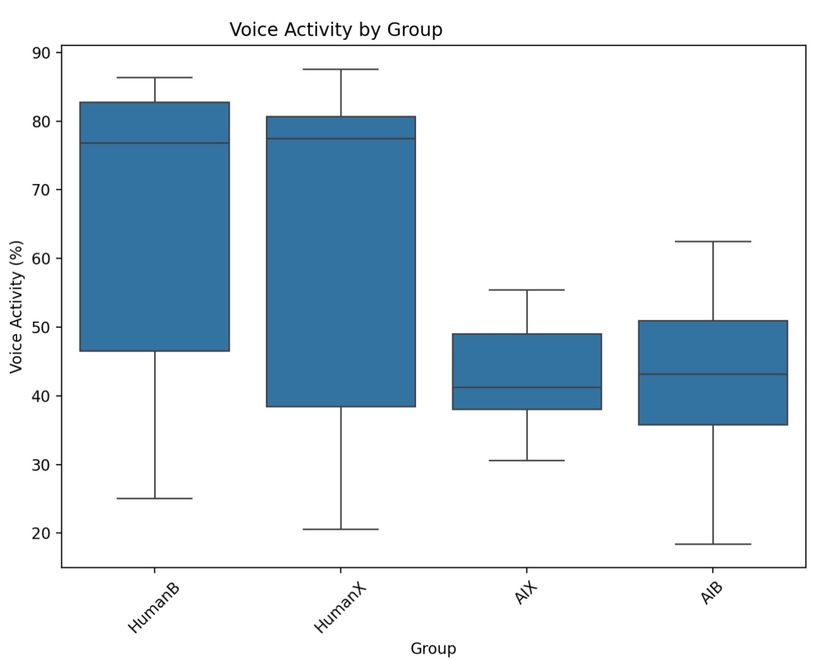
Here is real-time brain data from a participant in one of my neuroscience studies: You can see how we monitor EEG for cognitive activity, ECG for physiological arousal, and eye-tracking for visual attention. Here are some practical reminders of what we learn from participants and these types of studies:
1) You can create surprise (which can impact memory) with sequence. It’s not only what you show, but when you show it. So, analyze the flow of segments in your communication and consider breaking that flow right before important points.
2) Clarity without struggle feels good, but clarity after struggle feels earned. Your audience's brains will appreciate fluency and ease, but... consider offering it after tension and some difficulty. Otherwise, fluency is an illusion: people think they will remember something in the moment, but they forget very quickly (sort of like hearing a good joke that you think you will remember forever, but you don't). Make them work harder to detect ...
In one of my neuroscience studies, I wanted to see how buyers were reacting to a text-based email about the features of a software product vs. a brief demo about that product (also included in an email). What you’re seeing below is the aggregated heatmap from the group of buyers who saw the product demo inside the email. The heat maps enable us to detect where buyers are looking and for how long.
The product advertised was a software application that allows presenters to remove background noise when they hold virtual meetings and create a distraction-free environment (e.g., no dogs barking in the background).
Note from the heat maps how buyers’ attention gravitates toward the speaker’s face, especially the eyes and mouth. This was not surprising because the brain seeks out faces to interpret emotion, intent, and credibility. But then something subtle happens.
As the demo progresses, attention shifts, but not randomly, purposefully. Viewers follow the speaker’s gaze, then track...
I like this design for an intro slide in a professional presentation. Ambivalent stimuli (simultaneously positive and negative) can be memorable because they force the brain to resolve cognitive tension. The injured teddy evokes immediate tenderness and a protective impulse, which is far stronger than the neutral corporate graphic one would expect in a typical intro slide that merely states a topic.
So, to add extra tension and depth, which can impact memory, consider incorporating ambivalence into your compositions and pairing comfort with disruption.
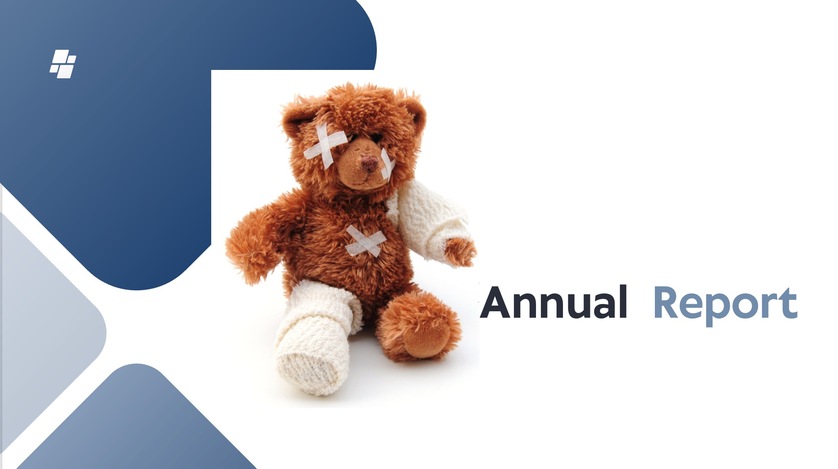
Neuroscience shows that fragile, perishable objects (a bubble, a flame, a melting ice cube) hold attention longer because the brain prioritizes “things that may vanish.” Philosophers like Heidegger linked fragility to presence. So, one practical guideline for communication that attracts attention is to use transient visuals (fading ink, dissolving letters, fragile objects). We used it on our website (enhancive.com) in the Design section to highlight the importance of memory in business. I like this approach to transience a lot because fMRI studies show stronger amygdala and hippocampal activation when we see stimuli that could disappear (fire, water drops, breaking glass). The brain is wired for urgency coding, meaning that fragile things get priority because they may not be there later.

One guideline that helps in the field of communication (and with the intent to make that communication memorable) is that the brain encodes not just the thing itself, but the context in which it appears. This is because the brain is engaged in what some scientists call active sensing, meaning that we seek out what is possible in a specific environment. The brain’s power of prediction did not use to have a lot of scientific focus, mainly because it’s somewhat common sense. If you go to your doctor’s office, you can recognize her in that context, but when you see her at the grocery store, it takes you a while to place her. In this example, the contrast between object and context is greater, partly because she is probably wearing different clothes and partly because you did not expect to see her there.
In light of these observations, you can consider one guideline to attract attention and create memories in other people’s brains: take an object, a service, or a product that is ...

I am noticing that businesses often promise their customers personalized services as a means of differentiation. We offer “tailored solutions,” “customized experiences,” or we “focus on what matters most to you”…. they typically say. Yet, these promises are packaged in standardized presentations filled with generic stock photos. You must have seen slides like the one below many times: Images of generic meetings, people at laptops, or happy people looking at phones. Despite the claim of a “tailored approach,” the content feels like it could belong to any brand.
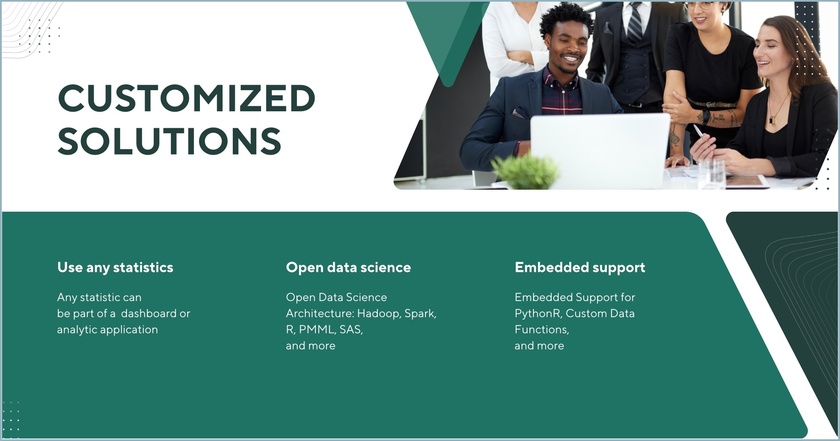
This conflict between the promise of personalization and templatized design creates cognitive friction for the viewer, who unconsciously senses a disconnect between the message of uniqueness and the impersonal images they’re seeing. Cognitive friction occurs when an audience encounters content that feels out of sync with the promised message. The brain, always searching for coherence, struggles to reconcile this gap, making the message less memorable and even eroding trust.
There are several ways to fix this, but here are three. Use images and compositions that help your audience envision:
- The experience they will have while working with you
- The process they will complete to achieve business results and/or
- Outcomes they are seeking
The following slides are from a sales presentation we designed for a platform used in predictive and prescriptive analytics. Each slide exemplifies one of the guidelines above.
Visualizing experiences
Using this slide, the vendor visualizes a proposed journey and explains to his customers how they can oscillate between action and insight by using various software capabilities. The screenshots are from the real application; they are not stock photos.
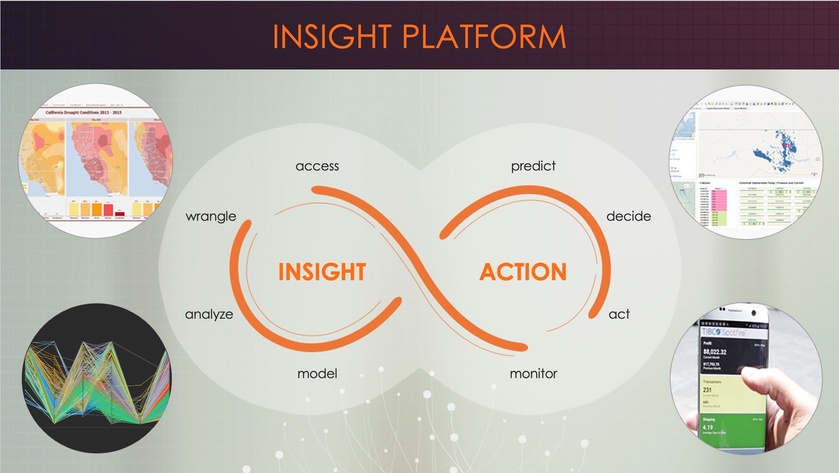
Visualizing process
These segments are displayed gradually (note how some are numbered) to explain how the process of working with the vendor and the software will unfold. This step-by-step breakdown gives a concrete sense of how collaboration happens in real life.
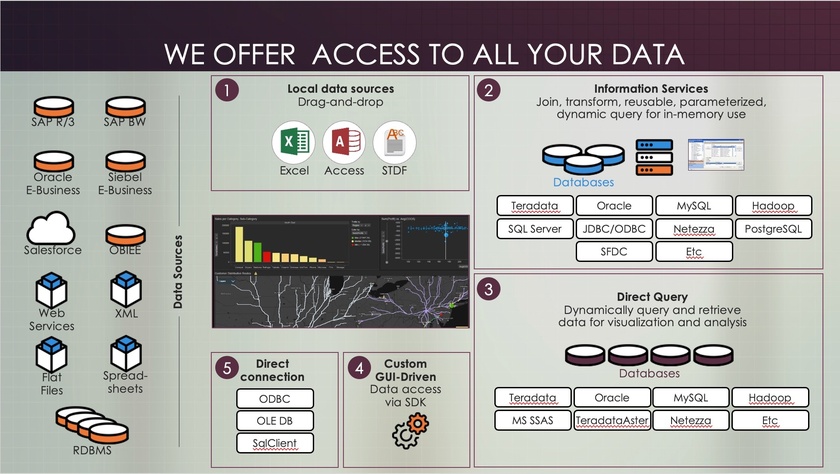
Visualizing outcomes
This slide is presented multiple times to remind customers why this vendor’s solution is useful. Displaying expected results reinforces the value that a solution can bring.

Throughout these examples, notice the absence of overly staged smiles and generic stock photos—the kind that make presentations feel interchangeable, standard, and impersonal.
By anchoring your message in authentic experiences, clear processes, and real outcomes, you’re aligning your content with the brain’s natural drive for coherence. This approach reduces cognitive friction and reinforces the trust you’ve promised through personalization. The result? A presentation that feels unique, credible, and memorable—one that embodies the tailored experience you’ve promised.
In one of my neuroscience studies, I decided to compare the brain's response to a business video meant to intrigue buyers with an app versus... well, a video of tea brewing. As you can see below, nothing but tea leaves slowly steeping. I thought, 'This is going to be the ultimate snooze test.' But to my surprise, people weren’t bored! On the contrary, they enjoyed the moment and remembered it later. I suspect one of the reasons is because of a process called reflexive thinking.

Reflexive thinking is a kind of mental space where, when there isn’t much happening on screen, our brains start filling in the blanks. We reflect on our own thoughts, make connections, or dig into personal insights. This state doesn’t just hold attention—it encourages better memory and even creativity.
Of course, the surprising results might also be due to anticipation. Even with slow visuals, the brain stays alert, waiting for the unexpected. Maybe something surprising will emerge from the cup? This quiet anticipation keeps viewers engaged on a subtle level, almost as if they’re playing a mental game with the content.
The brain thrives on the unseen edges of a moment, where thought meets possibility.
So, how can you use this in your own content, even if you’re not a designer?
- Use gentle transitions: Instead of sharp cuts or rapid slides, try slow fades. They subtly signal the brain to slow down, encouraging a deeper mental pause.
- Create a few minimalist moments: Include a slide with just one word or a blank pause with a simple background. This "mental whitespace" gives viewers time to digest what came before, making it effective even in tech-heavy presentations (as long as it's kept to a minimum).
- Slow down the summary: Consider using a reflective tone to signal a shift from information delivery to introspection. This change in pace cues your audience that it’s time to absorb and reflect on what they’ve learned, reinforcing their memory of the content as they mentally summarize it themselves.
Sometimes, the mind finds depth not in speed but in the silent pull of what might come next.












